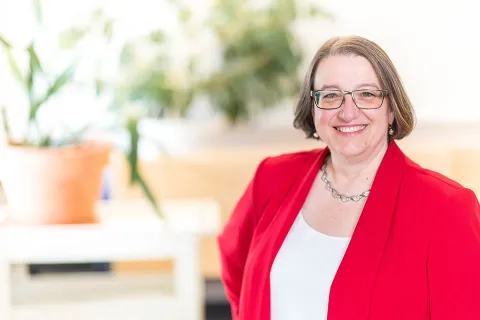Celebrating diversity and fostering inclusion to improve the health of 2SLGBTQ+ youth

A version of this article was originally published on the Canadian Institutes of Health Research website.
The environment in which we grow up can often have profound impacts on our development in adolescence and adulthood – including impacts our physical and mental health. So how can we create more inclusive and supportive environments for youth to help them live healthier, happier lives?
This is the question Dr. Elizabeth Saewyc, Executive Director of the Stigma and Resilience Among Vulnerable Youth Centre (SARAVYC) at the University of British Columbia, and her research team are exploring, particularly around 2SLGBTQ+(Two-Spirit, Lesbian, Gay, Bisexual, Transgender, Queer or Questioning, plus) youth.
"We have seen over many years – not just in Canada but around the world – that sexual minority and gender diverse youth experience more rejection, bullying, discrimination, and enacted stigma than cisgender, heterosexual youth," Dr. Saewyc explained. According to her research, this discrimination and stigma can lead to health-related issues: not only do 2SLGBTQ+ youth face higher rates of stress, depression, and suicidality, but they are also at higher risk of experiencing unwanted sexual encounters, facing early pregnancy, and using substances to cope.
"These health issues are strongly linked to the stigma, discrimination, and trauma that 2SLGBTQ+ youth face," said Dr. Saewyc. "Through our research, we're trying to understand the impact of this stigma on youths' health and wellbeing, but more importantly, understand what protective factors can help make a difference in spite of that stigma. We then want to share that information with youth, families, schools, and communities across Canada – through online resources, educational materials, videos and more – so we can help overcome the stigma and create more supportive environments for 2SLGBTQ+ children."
Improving health and wellness among 2SLGBTQ+ youth
Fostering supportive environments for 2SLGBTQ+ youth is crucial because, as Dr. Saewyc explained, having a strong social support network – including family members, friends, classmates, and schoolteachers – is a key factor contributing to youths' health and wellbeing. In fact, it has been shown that when youth feel they have strong family support and school connectedness, they are more likely to have good mental health and less likely to engage in substance abuse.
The challenge, however, is that many 2SLGBTQ+ youth tend to not have these support networks in place. "We actually see that 2SLGBTQ+ youth have lower levels of support from family, they feel less safe and connected in school, or they feel that their teachers and others may not care about them as much," Dr. Saewyc said. "This can be detrimental to their mental health, but it can also make them less likely to seek out information or resources to support their physical and sexual health."
In recent years, some data have shown positive trends and improvements in the way 2SLGBTQ+ youth are treated in Canada. Other data, however, suggest a digression in progress. In British Columbia, for example, Dr. Saewyc and her team have seen an increase in sexual harassment and racism since 2018, compared to the previous five to ten years. "We do think that some of it may be because of the changes in the political environment in other countries and that is playing a role here in Canada as well," Dr. Saewyc pointed out.
This is why Dr. Saewyc's research doesn't stop at the border. While her work has been cited by the Canadian Human Rights Commission as well as courts in British Columbia and Alberta to influence policies and court rulings in Canada, it is also helping advance knowledge in the United States, New Zealand, and countries across Europe. By working with diverse international partners, Dr. Saewyc's team is studying the policies, practices, and interventions that are being used in other countries – and understanding how they could be applied to the Canadian context.
Focus on families
In addition to their evidence-based educational materials and resources, Dr. Saewyc and her team are setting their sights on developing new tools to help parents and families of 2SLGBTQ+ youth give their children the support they need.
"While there's been a lot of work done in schools to foster strong school connectedness and make it safer for young people, there's not a lot of interventions out there on helping families be more supportive of their queer and trans kids," Dr. Saewyc explained. "A lot of parents tell us they want to be supportive, they just don't know how."
To address this gap, Dr. Saewyc and her team are working to develop an interactive, smartphone-based program for parents of 2SLGBTQ+ youth to access the support they need to better support their child. Dr. Saewyc's team is conducting interviews with families across Canada to understand what resources would have been helpful for them, particularly during their child's coming out stage, in hopes of helping other families create a more open and supportive environment for their children in the future.
"We know that the stronger the family and community support is for queer and trans youth, the better their health outcomes are," she emphasized. "But it's not a one-size-fits all approach, so doing this research to understand youth and families' needs – especially among diverse groups – is crucial."
Recognizing that families from diverse backgrounds, cultures, and geographic regions in Canada may have different needs when it comes to supporting their 2SLGBTQ+ child, Dr. Saewyc stressed the importance of taking a "nothing about us without us" approach to her work. By working collaboratively with community partners, queer and trans youth, parents and families, Dr. Saewyc is optimistic that her team's research will help make a difference in the lives of 2SLGBTQ+ youth across Canada.
"Ultimately, we are aiming to create evidence-based tools to support families, who can then help their queer and trans kids be as healthy and happy as possible," said Dr. Saewyc. "And with all of this work, what we really want 2SLGBTQ+ youth to know is simply: You are loved. And you matter."


